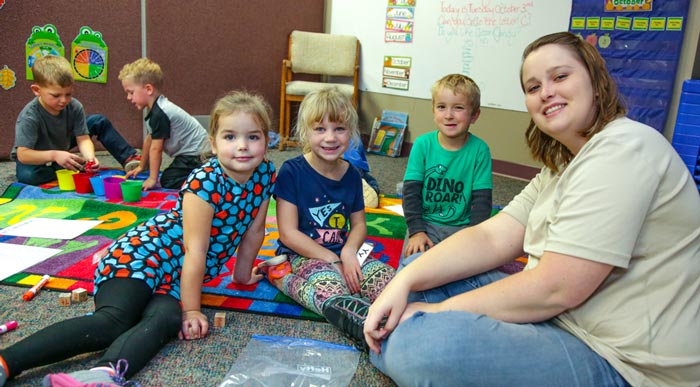Energy Capital Cooperative Child Care (ECCCC)
- Need: To bring needed child care to rural Mercer County, North Dakota.
- Intervention: A nonprofit cooperative provides part-time and full-time child care.
- Results: ECCCC currently has about 75 children enrolled, but it had 86 children at the height of its enrollment history.
Description
Mercer County Economic Development's 2015 Housing & Socioeconomic Assessment determined that rural Mercer County, North Dakota, needed 291 more childcare spots to meet demand. After this assessment was completed, additional childcare providers closed. Since lack of child care can deter new employees from moving to the area and affect current employees' ability to work, eight employers in the county formed the Energy Capital Cooperative Child Care (ECCCC). The cooperative business model allows parents to be board members who supervise the director and decide on strategy and education. In addition, parents have voting rights.
The cooperative's founding partners are:
- Basin Electric Power Cooperative
- Coal Country Community Health Centers
- Coyote Station
- Hazen Public Schools
- Knife River Care Center
- North American Coal Corporation
- Sakakawea Medical Center
- Union State Bank
Services offered

ECCCC is open Monday through Friday, 7:00 a.m. to 5:30 p.m., to help accommodate parents on shift work. Parents can enroll their children as full-time (4+ days per week) or part-time (3 or fewer days per week). Parents on shift work are asked to submit their children's schedule 4 weeks early so ECCCC can coordinate with other shift-working families' schedules.
Although not licensed as a preschool, ECCCC provides a daily educational curriculum.
Results
The New Bethel Center opened in May 2017 in a vacated church in Hazen. The New Bethel Center has a capacity of 77 children (ages 0-12) at any one time in the building. The school-age room is located at the elementary school. Children are there for full days in the summer and non-school days as well as after school during the school year.
Current enrollment is about 75 children. ECCCC had 86 children at the height of its enrollment history.

Challenges
Tuition does not cover payroll and payroll taxes. In addition, Mercer County is a high-income area, so grant funds are largely unavailable to ECCCC. Childcare funding opportunities are listed on the RHIhub website.
Childcare licensing and fire inspection standards are high. Have your childcare licensor and fire marshal walk through any facilities being considered to identify potential issues.
Staffing is a challenge, since the county does not have a large labor pool for this type of work. ECCCC is able to pay its employees a higher wage than the average salary offered in larger communities, which can help retain staff. Staffing is stable during the summer, with high school workers, but remains a challenge during the school year.
Replication
The board of directors currently is made up of people from the founding partners as well as a couple parents whose children attend ECCCC and who work for the founding partners.
Volunteers helped remodel the church and build the playground. Bringing in volunteers can help reduce costs and get the community, especially parents, invested in the center.
The North Dakota Association of Rural Electric Cooperatives' Rural Development Finance Corporation (RDFC) is a useful resource, with expertise in childcare start-ups. RDFC provides technical support for ECCCC.

Contact Information
Cara Grinsteinner, DirectorEnergy Capital Cooperative Child Care
701.748.3838
energycapital@westriv.com
Topics
Child care
· Children and youth
· Community and economic development
· Community engagement and volunteerism
· Families
States served
North Dakota
Date added
June 18, 2018
Suggested citation: Rural Health Information Hub, 2025 . Energy Capital Cooperative Child Care (ECCCC) [online]. Rural Health Information Hub. Available at: https://www.ruralhealthinfo.org/project-examples/1017 [Accessed 25 February 2026]
Please contact the models and innovations contact directly for the most complete and current information about this program. Summaries of models and innovations are provided by RHIhub for your convenience. The programs described are not endorsed by RHIhub or by the Federal Office of Rural Health Policy. Each rural community should consider whether a particular project or approach is a good match for their community’s needs and capacity. While it is sometimes possible to adapt program components to match your resources, keep in mind that changes to the program design may impact results.
